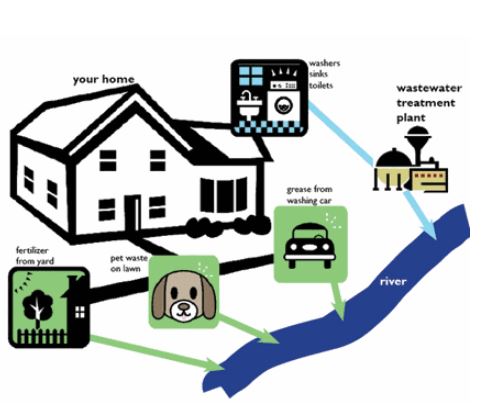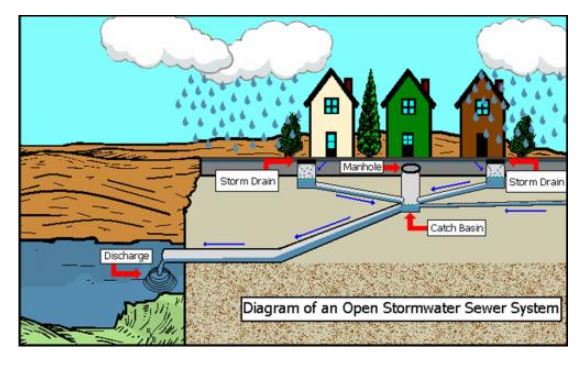Stormwater
Stormwater Information *UPDATED*
Stormwater Pollution Prevention
For Kids
Learn About Stormwater Science

What is stormwater?
It is simply any water that comes in contact with or collects on the ground. Stormwater includes rain water runoff, snow melt, or other waters that flow to streams, wetlands and other waterbodies such as our reservoirs.
What's the problem?
As it flows, stormwater runoff collects and transports animal waste, litter, salt, pesticides, fertilizers, oil & grease, soil, and other potential pollutants. Rain and snowmelt wash pollutants from streets, construction sites, and land into storm sewers and ditches. Eventually, these empty the polluted stormwater directly into streams and rivers with no treatment. This is known as stormwater pollution.
Toxic substances from motor vehicles and careless application of pesticides and fertilizers threaten water quality and can kill fish and other aquatic life. Bacteria from animal wastes and improper connections to storm sewer systems can make lakes and waterways unsafe for wading, swimming and fish consumption. Eroded soil is a pollutant as well. It clouds the waterway and interferes with the habitat of fish and plant life.
Are sanitary sewer systems and a storm sewer systems are the same? NO. Water that goes down a sink or other inside drain flows to either a wastewater treatment plant or to a septic system for treatment. Storm sewer flows are not treated. Water that flows down driveways, streets, and outside areas into a storm sewer or ditch flows directly to nearby creeks, fish and wildlife habitats, downstream recreational areas, and drinking water supplies.
There are many types of pollutants that find their way into storm drains.
Some common pollutants found in storm sewers and creeks include
Animal waste
Litter
Motor oil
Yard clippings
Fertilizers and pesticides
Soapy car wash water
Eroded sediment from construction projects
It's important to remember that any type of surface water runoff, not just rainfall, can run into the storm sewer and collect in the stormwater management system. For example, when you wash your car on the driveway, that water, dirt, and grime ends up in the system. That's why we need to be careful with what we put into the storm sewers as traces of all this material can end up in the stormwater system and our local waterways.
Spills & Violations
Please contact the Bellingham DPW @508-966-5813 if you are aware of any spills or violations.
10/3/23

What is a Stormwater Utility?
In 2019, Bellingham Town Meeting adopted a stormwater utility and was implemented with the Fall 2020 billing. This utility is a charge to all property owners to fund the stormwater management services of the Town. The fee varies depending on property use and impervious surface. These Federally mandated services consist of :
· Transfer, control, conveyance or movement of Stormwater runoff through the Town;
· Maintenance, repair and replacement of existing Stormwater Management Systems and Facilities;
· Planning, development, design and construction of new, expanded or upgraded Stormwater Management Systems and Facilities to meet current and anticipated needs or to reduce the discharge of Stormwater pollutants to wetlands or waterways, ensure that the rate or volume of runoff discharged to wetlands or waterways approximates pre-development hydrology, or prevent or remediate flood damage;
· Regulation of the use of stormwater management services, systems and facilities on public or private properties in Bellingham; or
· Compliance with applicable state and federal stormwater management regulations and permit requirements.
Why is There a New Charge on My Bill?
- EPA MS4 (Municipal Seperate Storm Sewer System) Stormwater Management Program (October 2020)
- EPA MS4 (Municipal Seperate Storm Sewer System) Permit - Notice of Intent 20180920
- Storm Sewer (Storm Drain Infrastructure Map 2018)
Additional links for more information.
https://www.thinkbluemassachusetts.org/
Charles River Watershed Association
https://www.crwa.org/
Blackstone River Watershed Association
http://www.thebrwa.org/

